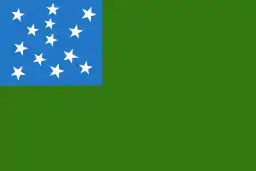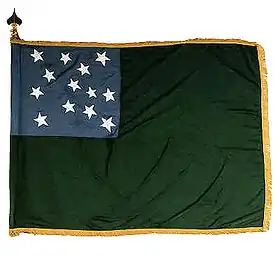Second Vermont Republic
The Second Vermont Republic (SVR, 2VR) is a secessionist group within the U.S. state of Vermont which seeks to restore the formerly independent status of the Vermont Republic (1777–91). It describes itself as "a nonviolent citizens' network and think tank opposed to the tyranny of Corporate America and the U.S. government, and committed to the peaceful return of Vermont to its status as an independent republic and more broadly the dissolution of the Union." The organization was founded in 2003 by Thomas Naylor (1936–2012),[1][2] a former Duke University economics professor and co-author of the 1997 book Downsizing the U.S.A.[3] A 2010 TIME article featured the Second Vermont Republic as one of the "Top 10 Aspiring Nations".[4]
 Flag adopted by the 2VR movement | |
| Abbreviation | 2VR |
|---|---|
| Formation | 2003 |
| Founder | Thomas Naylor |
| Type | Political |
| Purpose | Secession of Vermont into independent republic |
| Location | |
| Affiliations | Middlebury Institute, Vermont Commons |
| Website | https://vermontindependent.net/ |
History
The Second Vermont Republic movement was founded in 2003 by Thomas Naylor, who published the book The Vermont Manifesto that same year.[5] He was motivated by the September 11 attacks. Vermont's Bread and Puppet Theater were early supporters.[6] Naylor began informal meetings of the group, holding the first statewide meeting in October 2003. In June 2004 Second Vermont Republic and Bread & Puppet Theater sponsored a parade in Montpelier and a rally of over 300 people at the State House calling for Vermont independence.[7] University of Vermont professor Frank M. Bryan, co-author of the humorous novel OUT! The Vermont Secession Book,[8] later joined the Advisory Board of the Second Vermont Republic.[9]
The "independence" flag adopted by the Second Vermont Republic[10] is similar in design to the Green Mountain Boys regimental flag flown by those who supported creation of the first Vermont Republic.[11]
The Second Vermont Republic hosted a "radical consultation" in Middlebury, Vermont in November 2004 which resulted in the creation of the Middlebury Declaration[12] and the establishment of the Middlebury Institute. In April 2005, members of Second Vermont Republic started the Vermont Commons quarterly publication. In January 2005, the Second Vermont Republic stated it had 125 card-carrying members.[13] In October 2005 300 people attended Second Vermont Republic's first statewide secession convention in the House Chamber of the Vermont State House.[14]
In November 2006 the group's representatives attended the First North American Secessionist Convention in Burlington, which brought together secessionists from a broad political spectrum.[15][16][17][18] The convention issued the Burlington Declaration.[19]
In April 2007 the University of Vermont Center for Rural Studies released its annual "Vermonter Poll" which showed that thirteen percent of eligible voters in Vermont supported secession.[14] That month Frank Bryan and Vermont Commons publisher Ian Baldwin authored an op-ed piece for the Washington Post, "The Once and Future Republic of Vermont". The authors wrote "Vermont did not join the Union to become part of an empire. Some of us therefore seek permission to leave."[20] In June 2007, Frank Bryan stated that "the cachet of secession would make the new republic a magnet" and "People would obviously relish coming to the Republic of Vermont, the Switzerland of North America."[1] In November 2007, Naylor also endorsed the idea of a greater "New Acadia, comprising of Vermont, New Hampshire, Maine, and the Canadian provinces of New Brunswick, Prince Edward Island, Nova Scotia, and Newfoundland and Labrador.[21]
In May 2008, Feral House published Thomas Naylor's book Secession: How Vermont and all the Other States Can Save Themselves from the Empire. Author Kirkpatrick Sale wrote the foreword.[22] In the book he writes about diplomat George F. Kennan being "a major source of inspiration for the Second Vermont Republic."[23] A 2010 Time magazine article quoted Naylor as describing the Second Vermont Republic as "left-libertarian, anti-big government, anti-empire, antiwar, with small is beautiful as our guiding philosophy".[24]
In 2012 Thomas Naylor, Kirkpatrick Sale, Chellis Glendinning, Carolyn Chute and two others issued "The Montpelier Manifesto", carried on the Second Vermont Republic website, as a "Document of Grievances and Abuses" with specific suggestions for a "Redress of Grievances."[25]
Political campaigns
In January 2010, nine Vermonters announced they were planning to run for governor, lieutenant governor and seven seats in the state Senate on a Vermont secession platform[26] and labeling their effort "Vermont Independence Day."[27] A Time magazine article quoted gubernatorial secessionist candidate Dennis Steele's statement that his first act of office would be bringing Vermont National Guard members home from overseas military deployments.[24]
Frank Bryan criticized the 2010 secessionist electoral candidates for running for statewide offices instead of local offices to establish a record. "They want to go to the top immediately with candidates who really don't have a lot of experience in governing." Naylor disagreed, saying "Dennis Steele has done more for the Vermont independence movement in the last six months than anyone has done in the last seven years. The only way you could have that platform is by running for governor."[26]
Gubernatorial candidate Dennis Steele received .8 percent of votes cast for that office; Lieutenant Governor candidate Peter Garritano received 4.7 percent. Both ran as independents.[28]
In September 2012 the Vermont Independence Party held its convention inside the Vermont Statehouse.[29][30]
Reception
In 2006, John McClaughry, president of Vermont's Institute for Liberty and Community and co-author with Frank Bryan of The Vermont Papers, Recreating Democracy on a Human Scale, told the Los Angeles Times: "This really is a good-natured cult. Intellectually, they've got some horsepower, but mostly this is the whole left-wing litany, seen through an interesting prism." Secession, said McClaughry, "is not going to happen, and no one believes it is going to happen."[31]
In early 2007, an anonymously written blog, using material published by the Southern Poverty Law Center (SPLC), revealed that some advisory board members had affiliations with Neo-Confederate groups, such as the League of the South (LOS), resulting in internal and public controversy.[32][33] In reaction, SVR co-founder Thomas Naylor told The Vermont Guardian that the organization has no direct link to LOS, except a link on the SVR website, and that SVR is not racist. He told a radio audience: "The SPLC is a well-known McCarthy-style group of mercenaries who routinely engage in ideological smear campaigns on behalf of their wealthy techno-fascist clowns. It's all about money, power, and greed."[34]
However, in response to this controversy, groups such as the Green Mountain Anarchist Collective (GMAC), who were generally favorable to the idea of Vermont secession and an empowered Town Meeting system of self-government, became publicly critical of the organization. GMAC published these misgivings in the Catamount Tavern News; Vermont Secession: The Extreme Right, And Democracy.
In early 2008, SPLC did a long article about the group and interviewed Naylor.[35] In July 2008, Naylor asked the League of the South to consider several actions to distance itself from the taint of racism.[36] In October 2009 another SPLC article described the group's ongoing relationship with the League of the South.[37]
See also
- Flag of the Vermont Republic
- Green Mountain Anarchist Collective
- History of Vermont
- Politics of Vermont
- Killington, Vermont secession movement
- Free State Project
References
- John Curran, Vt. Secession Movement Gains Traction, Huffington Post, June 4, 2007.
- Nancy Remsen, Second Vermont Republic founder Thomas Naylor has died Archived 2013-01-18 at Archive.today, Burlington Free Press, December 17, 2012.
- Thomas H. Naylor, William H. Willimon, Downsizing the U.S.A., Wm. B. Eerdmans Publishing, 1997, ISBN 9780802843302
- Vermont, one of the Top 10 Aspiring Nations, Time magazine, January 31, 2011.
- Thomas H. Naylor, The Vermont Manifesto, Xlibris Corporation, October 7, 2003.
- Heidi Beirich, Second Vermont Republic Pushes For Independence of Vermont, SPLC, Summer 2008.
- Thomas Naylor, Second Vermont Republic website.
- Frank Bryan and Bill Mares, OUT! The Vermont Secession Book,, The New England Press 1987, 6-8.
- Vermont Secessionists Meet with Racist League of the South, Alternet, June 5, 2008.
- Independence Icons, including flag, at Second Vermont Republic web site Archived 2011-02-02 at the Wayback Machine.
-
- Cooper, Grace Rogers Cooper, Grace Rogers (1973). Thirteen Star Flags. Smithsonian Institution Press. Available online (21.7 MB)
- Karen Price Hossell, Ethan Allen, Heinemann-Raintree Classroom, 2004, p 14.
- Michael Flocker, Vermont: The Green Mountain State, World Almanac Library of the States, Gareth Stevens, 2002 p 11.
- Text at Middlebury Institute website Archived 2014-10-17 at the Wayback Machine.
- Christopher Ketcham,Long live secession! Salon.com, January 20, 2005.
- Anthony Wile, Thomas H. Naylor on Leviathan, Secession and Vermont's Small Nation Dream, LewRockwell.com, May 14, 2012.
- Gary Shapiro, Modern-Day Secessionists Will Hold a Conference on Leaving the Union, The New York Sun, September 27, 2006, 6.
- Kirkpatrick Sale, The First North American Secessionist Convention, Breaking Away, CounterPunch, October 5, 2006.
- Paul Nussbaum, Coming together to ponder pulling apart, Latter-day secessionists of all stripes convene in Vermont, Philadelphia Inquirer, November 6, 2006.
- Call for Representatives and post-convention report at Middlebury Institute website Archived 2013-01-21 at the Wayback Machine.
- Text of Burlington Declaration at Middlebury Institute website Archived 2015-11-01 at the Wayback Machine.
- Frank Bryan and Ian Baldwin Op-Ed: The Once and Future Republic of Vermont, Washington Post, April 1, 2007.
- Levin, John (August 5, 2009). "How Is America Going To End?". Slate. Retrieved October 25, 2019.
- Thomas Naylor, Secession: How Vermont and all the Other States Can Save Themselves from the Empire, foreword by Kirkpatrick Sale, Feral House books, 2008.
- Andrei Kreptul, Secession: The Final Frontier, LewRockwell.com, July 11, 2008.
- Christopher Ketcham, The Secessionist Campaign for the Republic of Vermont, Time magazine, January 31, 2010.
- Thomas H. Naylor, Kirkpatrick Sale, James Starkey, Chellis Glendinning, Carolyn Chute and Charles Keil, The Montpelier Manifesto, at Second Vermont Republic website, September, 2012.
- Andy Bromage, Vermont's Secessionist Movement Debuts Something New: Candidates, Seven Days, September 8, 2010.
- John Curran, 9 Vt. state office candidates favor secession, Associated Press story at Boston Globe, January 13, 2010.
- Elections Divisions results, 2010 (PDF).
- Vt. Independence Party to meet in Montpelier Archived 2013-08-01 at the Wayback Machine, WCAX-TV News, September 12, 2012.
- Vermont Independence Party convention, Seven Days newspaper, September 2012.
- Elizabeth Mehren, Secession -- a Revolutionary Idea", Los Angeles Times, September 24, 2006.
- Second Vermont Republic/Vermont Commons Tied to White Supremacists Archived 2007-03-03 at the Wayback Machine, Vermont Guardian, February 9, 2007.
- Is Second Vermont Republic Affiliated with Racists?, Seven Days, February 28, 2007.
- Christian Avard, Secessionists or racists? Concerns raised over Vermont links to neo-Confederates, Vermont Guardian, February 23, 2007.
- Second Vermont Republic Pushes For Independence of Vermont, SPLC ntelligence Report, Summer 2008, Issue Number: 130.
- Heidi Beirich, Second Vermont Republic Calls on League of the South to Denounce Racism, SPLC website, July 3, 2008.
- Rob Waters, Yankee Secessionist Back in Cahoots with Neo-Confederates Archived 2011-06-08 at the Wayback Machine, SPLC website, October 1, 2009.
External links
- Second Vermont Republic home page
- Vermont Commons, the journal of Vermont Independence (See also: Vermont Commons YouTube.Com videos.)
- A Vision of a Nation No Longer in the U.S.,The New York Times, October 18, 2007.
- Myths and Documents by Vermont State Archivist, Gregory Sanford.
- Free Vermont, Bill Kauffman, The American Conservative, December 19, 2005.
- Frank M. Bryan, The Case for Vermont's Secession, VermontCommons web site, April 22, 2005.
- Christopher Ketcham, The Rise of a Green Tea Party, CounterPunch, September 2, 2010.
- Neither Washington Nor Stowe: Common Sense For The Working Vermonter, by The Green Mountain Anarchist Collective, Catamount Tavern Press, 2004.
